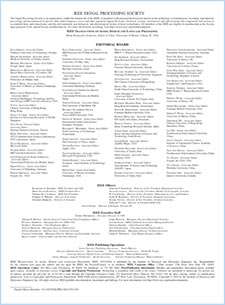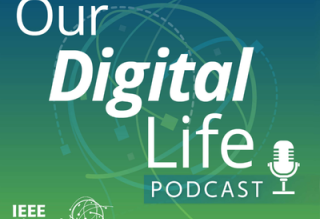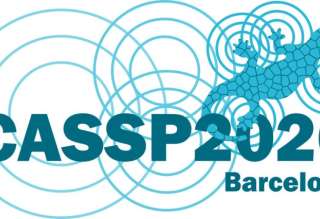- Our Story
- Publications & Resources
- Publications & Resources
- Publications
- IEEE Signal Processing Magazine
- IEEE Journal of Selected Topics in Signal Processing
- IEEE Signal Processing Letters
- IEEE Transactions on Computational Imaging
- IEEE Transactions on Image Processing
- IEEE Transactions on Information Forensics and Security
- IEEE Transactions on Multimedia
- IEEE Transactions on Signal and Information Processing over Networks
- IEEE Transactions on Signal Processing
- IEEE TCI
- IEEE TSIPN
- Data & Challenges
- Submit Manuscript
- Guidelines
- Information for Authors
- Special Issue Deadlines
- Overview Articles
- Top Accessed Articles
- SPS Newsletter
- SigPort
- SPS Resource Center
- Publications FAQ
- Blog
- News
- Dataset Papers
- Conferences & Events
- Community & Involvement
- Professional Development
- For Volunteers
- Information for Authors-OJSP
-
Home
Conferences Events IEEE Signal Processing Magazine IEEE SPL Article IEEE TIFS Article IEEE TMM Article IEEE TSP Article Jobs in Signal Processing Lectures Machine Learning Seasonal Schools Signal Processing News SPM Article SPS Distinguished Lectures SPS Newsletter Article SPS Webinar SPS Webinars SPS Webinar Series Webinar webinars
-
Our Story
What is Signal Processing?

The technology we use, and even rely on, in our everyday lives –computers, radios, video, cell phones – is enabled by signal processing. Learn More » -
Publications & Resources
-
SPS Resources
- Signal Processing Magazine The premier publication of the society.
- SPS Newsletter Monthly updates in Signal Processing
- SPS Resource Center Online library of tutorials, lectures, and presentations.
- SigPort Online repository for reports, papers, and more.
- SPS Feed The latest news, events, and more from the world of Signal Processing.
-
SPS Resources
-
Conferences & Events
-
Community & Involvement
-
Membership
- Join SPS The IEEE Signal Processing Magazine, Conference, Discounts, Awards, Collaborations, and more!
- Chapter Locator Find your local chapter and connect with fellow industry professionals, academics and students
- Women in Signal Processing Networking and engagement opportunities for women across signal processing disciplines
- Students Scholarships, conference discounts, travel grants, SP Cup, VIP Cup, 5-MICC
- Young Professionals Career development opportunities, networking
- Get Involved
-
Technical Committees
- Applied Signal Processing Systems
- Audio and Acoustic Signal Processing
- Bio Imaging and Signal Processing
- Computational Imaging
- Image Video and Multidimensional Signal Processing
- Information Forensics and Security
- Machine Learning for Signal Processing
- Multimedia Signal Processing
- Sensor Array and Multichannel
- Signal Processing for Communication and Networking
- Signal Processing Theory and Methods
- Speech and Language Processing
- Technical Working Groups
- More TC Resources
-
Membership
-
Professional Development
-
Professional Development
- Signal Processing Mentorship Academy (SigMA) Program
- Micro Mentoring Experience Program (MiME)
- Distinguished Lecturer Program
- Distinguished Lecturers
- Distinguished Lecturer Nominations
- Past Lecturers
- Distinguished Industry Speaker Program
- Distinguished Industry Speakers
- Distinguished Industry Speaker Nominations
- Industry Resources
- IEEE Training Materials
- Jobs in Signal Processing: IEEE Job Site
-
Career Resources
- SPS Education Program Educational content in signal processing and related fields.
- Distinguished Lecturer Program Chapters have access to educators and authors in the fields of Signal Processing
- Job Opportunities Signal Processing and Technical Committee specific job opportunities
- Job Submission Form Employers may submit opportunities in the area of Signal Processing.
-
Professional Development
-
For Volunteers
-
For Board & Committee Members
- Board Agenda/Minutes* Agendas, minutes and supporting documentation for Board and Committee Members
- SPS Directory* Directory of volunteers, society and division directory for Board and Committee Members.
- Membership Development Reports* Insight into the Society’s month-over-month and year-over-year growths and declines for Board and Committee Members
-
For Board & Committee Members
Popular Pages
Today's:
- (ASRU 2025) 2025 IEEE Automatic Speech Recognition and Understanding Workshop
- Information for Authors
- Membership
- Inside Signal Processing Newsletter
- Students
- IEEE Signal Processing Letters
- Call for Proposals: (SLT 2026) 2026 IEEE Workshop on Spoken Language Technology
- (ISBI 2026) 2026 IEEE 23rd International Symposium on Biomedical Imaging
- Meet SPS Member Ahmet Mete Elbir
- Congratulations to Signal Processing Society Members Elevated to Senior Members!
- Conferences
- Board of Governors
- Submit a Proposal for ICASSP 2030
- New Podcast Episode: Efficient Machine Learning Systems for Signal Processing
- Conference Call for Papers
All time:
- Information for Authors
- Submit a Manuscript
- IEEE Transactions on Image Processing
- IEEE Transactions on Information Forensics and Security
- IEEE Transactions on Multimedia
- IEEE Transactions on Audio, Speech and Language Processing
- IEEE Signal Processing Letters
- IEEE Transactions on Signal Processing
- Conferences & Events
- IEEE Journal of Selected Topics in Signal Processing
- Information for Authors-SPL
- Conference Call for Papers
- Signal Processing 101
- IEEE Signal Processing Magazine
- Guidelines
Last viewed:
- (ICME 2026) 2026 IEEE International Conference on Multimedia and Expo
- Conv-TasNet: Surpassing Ideal Time–Frequency Magnitude Masking for Speech Separation
- (ASRU 2025) 2025 IEEE Automatic Speech Recognition and Understanding Workshop
- Conference Resources
- (EUSIPCO 2025) 2025 European Signal Processing Conference
- Conferences
- Conference Workshop Author Resources
- (GlobalSIP 2018) 2018 6th IEEE Global Conference on Signal and Information Processing
- Members
- SPCOM TC Home
- Technical Committees
- GlobalSIP 2018
- Membership
- Synthetic Aperture Technical Working Group
- Member Highlight: Prof. Néstor Becerra Yoma
Sarcasm Detection with Commonsense Knowledge
You are here
Publications & Resources
For Authors
Top Reasons to Join SPS Today!
1. IEEE Signal Processing Magazine
2. Signal Processing Digital Library*
3. Inside Signal Processing Newsletter
4. SPS Resource Center
5. Career advancement & recognition
6. Discounts on conferences and publications
7. Professional networking
8. Communities for students, young professionals, and women
9. Volunteer opportunities
10. Coming soon! PDH/CEU credits
Click here to learn more.
Sarcasm Detection with Commonsense Knowledge
Sarcasm is commonly used in today's social media platforms such as Twitter and Reddit. Sarcasm detection is necessary for analysing people's real sentiments as people usually use sarcasm to express a flipped emotion against the literal meaning. However, the current works neglect the fact that commonsense knowledge is crucial for sarcasm recognition. In this paper, we propose a novel architecture in deep learning for sarcasm detection by integrating commonsense knowledge. To be specific, we apply the pre-trained COMET model to generate relevant commonsense knowledge. Besides, we compare two kinds of knowledge selection strategies to investigate how commonsense knowledge influences performance. Finally, a knowledge-text integration module is designed to model both text and knowledge. The experimental results demonstrate our model's effectiveness on three datasets, including two Twitter datasets and a Reddit dataset.
Sarcasm is a form of figurative language, defined as “the use of irony to mock or convey contempt”1, which is ubiquitous in social media platforms such as Twitter and Reddit. People tend to use sarcasm to express the opposite of superficial meaning [1]. The utterance “I love to see a doctor every day” expresses sarcastic meaning. It shows a negative sentiment towards the situation of “see a doctor every day”, even the utterance contains positive sentiment words such as “like”.
SPS Social Media
- IEEE SPS Facebook Page https://www.facebook.com/ieeeSPS
- IEEE SPS X Page https://x.com/IEEEsps
- IEEE SPS Instagram Page https://www.instagram.com/ieeesps/?hl=en
- IEEE SPS LinkedIn Page https://www.linkedin.com/company/ieeesps/
- IEEE SPS YouTube Channel https://www.youtube.com/ieeeSPS
Home | Sitemap | Contact | Accessibility | Nondiscrimination Policy | IEEE Ethics Reporting | IEEE Privacy Policy | Terms | Feedback
© Copyright 2025 IEEE - All rights reserved. Use of this website signifies your agreement to the IEEE Terms and Conditions.
A public charity, IEEE is the world's largest technical professional organization dedicated to advancing technology for the benefit of humanity.











